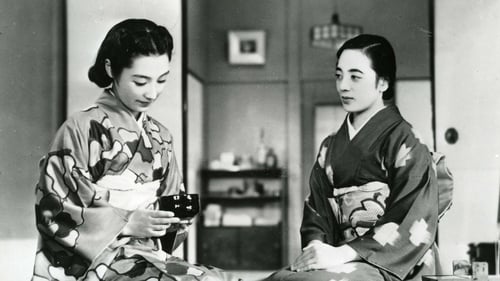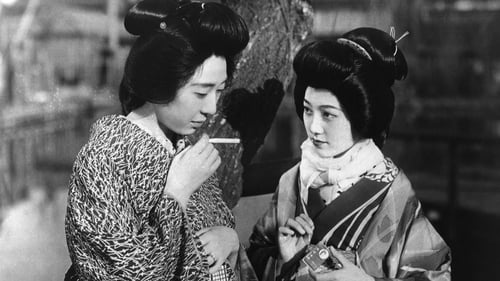
Japanese comedy film.

Sekikawa's wife
A 1948 Japanese film.

A lawyer fights doggedly for a more just legal system to rid Japan of its draconian penal system.

Kotobuki-za is a story of the Naniwa-bushi singer Baichuken Tsurumaru.

Japanese Warmovie

Based on the true story of a 17-year old Atayal girl called Sayun Hayun from Nan'oku village, Giran district, Taihoku Prefecture (in current Taiwan) who went missing and was thought to have drowned whilst helping carry the luggage of her teacher Masaki Takita during a storm in 1938.

Japanese war movie.

A nurse's tale of self-sacrifice during wartime. The title is borrowed from a patriotic song made popular by singer Hamako Watanabe during the Second Sino-Japanese War.

A city boy moves to the countryside and the kids there pick on him.

한 가족의 몰락과 재건에 관한 이야기를 담고 있는 이 작품은 당시 흥행과 작품성에서 모두 성공한 초기작으로 장면간의 전환 또는 휴지부로 기능하는 여백 쇼트의 사용, 움직임이 없는 정적인 카메라 등 가장 오즈적이라고 특징지을 수 있는 후기 작품들의 양식과 내러티브 형태가 특징적으로 드러나는 작품이다. 경제계의 거물이었던 도다씨의 갑작스러운 죽음 이후 둘째 아들 쇼지로는 중국 천진으로 돈을 벌기 위해 떠나고 남은 도다 부인과 막내 딸 세츠코는 귀찮은 존재로 외면당한 채 형제들 집을 전전하다 결국 처분조차 힘든 바닷가의 낡은 집으로 옮겨간다. 도다씨의 기일을 지내기 위해 천진에서 돌아온 쇼지로는 어머니와 여동생에 대한 형제들의 태도에 대해 분통을 터트린다.

Mitsuko
A follow-up to Children in the Wind, Four Seasons of Children(a.k.a. Kodomo no Shiki) is also based on a Tsubota Joji novel. The film is divided into two chapters, following the young protagonists' minor adventures and real-world awakenings over spring and summer, then autumn and winter.

A Japanese screwball comedy about the battle between the sexes: two timid men, egged on by their wives, end up in a bitter duel over an expensive lace handkerchief.

Geisha Ofune
The story deals with Fuji, nicknamed Waka-danna (Young Master), the star athlete on his university's rugby team. The son of a wealthy soy sauce manufacturer, Fuji basks in the glory of his athletic celebrity. Attracting the attention of admiring young women, Fuji resists family pressure to settle down and marry after college. Instead, he spends much of his time drinking and womanizing, behavior which eventually leads the college officials to expel him from the team.

키쿠에는 자신을 희생해서 아들 요시오를 홀로 키우지만 요시오는 언제부터인가 게이샤인 어머니를 부끄러워하며 나쁜 무리들과 어울리기 시작한다. 그를 사랑하는 아름다운 게이샤 테루기쿠는 갱 멤버로부터 그를 구출한다. 그러나 부모의 가난으로 자신의 누이동생이 팔려 갈 운명에 처하자 돈을 벌기 위해 그의 곁을 떠난다.

Japanese silent film.

Chiyoko, the wife
"The Dancing Girl of Izu" tells of the story between a young male student who is touring the Izu Peninsula and a family of traveling dancers he meets there, including their youngest girl. The student finds the naïve girl attractive even though he eventually has to part with the family after spending memorable time together.

Miwako
Part two of Shimizu's major silent Seven Seas, a family drama of the intertwining fates of the rich, decadent Yagibashis and the far less prosperous Sone family.

Madame
Film by Hiroshi Shimizu, featuring an early role for frequent Ozu and Naruse collaborator Hideko Takamine.

Miwako
The film is a lengthy work interweaving characters from different backgrounds and social strata in a narrative centered around the experiences of its heroine, Yumie Sone. Over two hours long, Seven Seas was released theatrically in two parts, with the first part entitled "Virginity Chapter" coming out in December 1931, while the second part, "Chastity Chapter," followed in March 1932. Near the beginning of the narrative, at a garden party given by the wealthy Yagibashi family in Tokyo, Yumie meets Takehiko, the Yagibashis' playboy son and the brother of Yumie's fiancé, Yuzuru. Yumie, a young middle-class woman, lives with her ailing father, a retired ministry official, an older sister, and a younger sister still a child (played by a very young Hideko Takamine). Takehiko, who has just returned from a trip to Europe, is attracted to Yumie and contrives to have her stay overnight at his family's mansion where he takes advantage of her.

Shinzaemon has been Sukeroku’s enemy ever since Sukeroku fought and defeated gangs from Shinzaemon’s group at a Kabuki theatre over Agemaki from Miuraya. Sukeroku swears that he will never draw his sword until he finds his family’s treasured blade, Tomokirimaru, so he gets insulted often by Shinzaemon’s men. Bunzaemon redeems Agemaki for Sukeroku ahead of Shinzaemon, but Sukeroku, ever the gentleman, does not accept. When Shinzaemon snatches Agemaki, it is found that he has Tomokirimaru.











